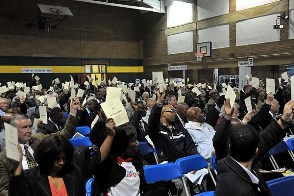To commemorate World Environment Day, 5 June 2009, the World Association for Christian Communication (WACC) is calling for action rather than words to solve environmental problems. "Global greenhouse emissions need to be dramatically reduced, while at the same time raising the quality of life for the majority of the world’s people."
The full text of the WACC statement, released June 5, reads, as follows: "On World Environment Day 2009, the World Association for Christian Communication (WACC) calls for action rather than words. It is time to move beyond information sharing alone. Time to advance a shared vision of a sustainable future. Time to strengthen capacity building aimed at solving or preventing environmental problems within the constraints of the finite world in which we live.
World Environment Day (WED) was established by the UN General Assembly in 1972 and is commemorated yearly on 5 June. Widespread activism and calls for action have created considerable awareness of the environment.
Yet, climate change caused by human activities continues to threaten the lives and livelihoods of billions of people and the existence of millions of species. Global greenhouse emissions need to be dramatically reduced, while at the same time raising the quality of life for the majority of the world’s people.
Social movements around the world are urging radical action, broadly based on the rich taking responsibility, leaving fossil fuels in the ground, fair and effective solutions, and equal access to resources.
Many support the Greenhouse Development Rights Framework.
The theme for WED 2009 is ‘Your Planet Needs You-UNite to Combat Climate Change’. It reflects the urgency for nations to agree on a new deal at the crucial climate convention meeting in Copenhagen in December 2009, and climate justice’s relevance to overcoming poverty.
WACC’s calls for better environmental communication: a two-way social interaction process that enables people to understand key environmental factors and their interdependence and to respond to problems in a competent way. Environmental communication is not so much information dissemination as building and reinforcing a shared vision of a sustainable future South and North."
WACC promotes communication for social change. It believes that communication is a basic human right that defines people’s common humanity, strengthens cultures, enables participation, creates community and challenges tyranny and oppression. WACC’s key concerns are media diversity, equal and affordable access to communication and knowledge, media and gender justice, and the relationship between communication and power. It tackles these through advocacy, education, training, and the creation and sharing of knowledge. The work of WACC dates back to 1950 and the organisation was formally established in 1968.

